Bone Health
Boost Bone Density Naturally With 10 Herbs
Kickstart your bone health journey with 10 powerful herbs that naturally boost bone density and strength, starting with the letter 'K'.

Boost your bone density naturally with 10 potent herbs. Red Sage, rich in salvianolic acid, enhances bone health. Red Clover, packed with phytoestrogens, reduces osteoporosis risk. Horsetail provides calcium, vitamin K, and silica for bone strength. Nettle promotes bone growth with essential nutrients. Thyme, abundant in vitamins C, K, and A, boosts mineral density. Alfalfa, high in vitamins and minerals, supports bone health. Try Turmeric for anti-inflammatory properties and musculoskeletal support. But use caution with Horsetail due to potential side effects. These herbs offer a natural solution for improving bone density and overall health.
Key Takeaways
- Red Sage and Red Clover enhance bone density with phytoestrogens and bone-protective effects.
- Horsetail, Oat Straw, and Alfalfa provide essential nutrients supporting bone health and density.
- Nettle promotes bone growth and mineral content for enhanced bone density.
- Turmeric aids in reducing inflammation and supports musculoskeletal and bone health.
- Thyme is rich in bone-strengthening properties, vitamins, and antioxidants for improved bone mineral density.
Red Sage Benefits
Red sage's bone-strengthening properties make it a valuable herb for enhancing bone density naturally. This herb, commonly used in traditional Chinese medicine, contains compounds such as salvianolic acid and tanshinones that have been linked to improving bone health.
Studies have indicated that red sage may play a role in enhancing bone mineral density, making it a potential ally in preventing bone loss. By incorporating red sage into our diet or as a supplement, we may support our bone health by increasing bone strength and density.
The compounds found in red sage offer promising benefits for overall bone health, potentially aiding in the prevention of bone-related issues. With its long-standing use in traditional medicine and the emerging research highlighting its potential, red sage stands out as a natural option to explore for those looking to improve their bone health in a holistic manner.
Red Clover Uses
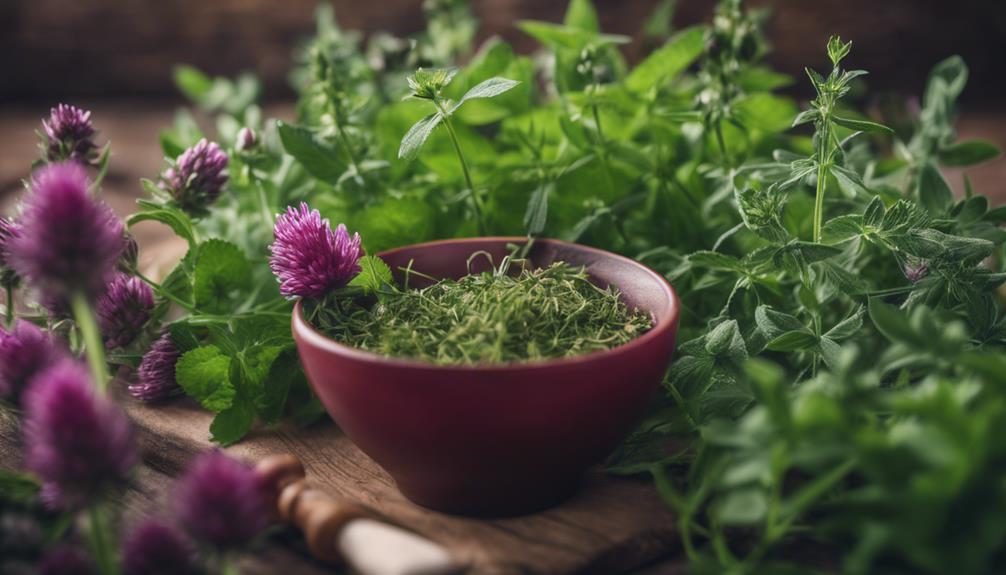
Red clover, a legume rich in phytoestrogens like isoflavones, is known for its potential bone-protective effects.
Studies suggest that incorporating red clover into one's diet may help improve bone mineral density and lower the risk of osteoporosis.
Red clover supplements are commonly used by postmenopausal women to support bone health and hormonal balance.
Red Clover Benefits
Rich in isoflavones that mimic estrogen in the body, red clover offers potential benefits for improving bone mineral density. Studies indicate that red clover supplements could help reduce the risk of osteoporosis and bone loss, particularly in postmenopausal women.
The isoflavones in red clover may play an essential role in promoting bone health by potentially increasing bone density and reducing the likelihood of fractures. Additionally, the anti-inflammatory properties of red clover further support its positive impact on bone health.
Consuming red clover through tea or supplements could be a natural way to enhance bone health and prevent bone loss. Incorporating this herb into your diet may provide valuable support in maintaining healthy bones and reducing the risk of osteoporosis.
How to Use
Utilizing red clover for its potential bone health benefits can be easily achieved through incorporating it into daily tea consumption or as a dietary supplement. Red clover, a popular herb in herbal medicine, is believed to have properties that could positively impact bone density and overall bone health. Research suggests that the compounds found in red clover may play a role in supporting bone strength and improving bone mineral density.
By including red clover in your routine, whether through brewing a cup of red clover tea or taking it as a supplement, you may be able to harness its natural remedy potential for enhancing bone health.
Adding red clover to your daily regimen could be a simple yet effective way to promote better bone density and potentially enhance overall bone strength. Whether you choose to enjoy a warm cup of red clover tea or opt for a red clover supplement, incorporating this herb into your routine may offer a natural approach to supporting your bone health.
Horsetail Properties

With its rich content of vitamins and minerals essential for bone health, horsetail is a powerful herb known for its beneficial properties. Horsetail, scientifically known as Equisetum arvense, is packed with important nutrients like calcium, vitamin K, and minerals such as silica, zinc, magnesium, iron, copper, and potassium, all of which play a significant role in supporting bone density and strength.
These components are necessary for bone health and regeneration, aiding in inhibiting osteoclasts which break down bone tissue. Consuming horsetail as a tea can be particularly advantageous due to its properties that resemble human bone joints, making it a natural choice for those seeking to support their bone health.
The high mineral content in horsetail, combined with its array of vitamins, makes it a valuable herb for promoting overall bone health and density, making it a valuable addition to a natural approach towards improving bone strength.
Thyme Nutrients
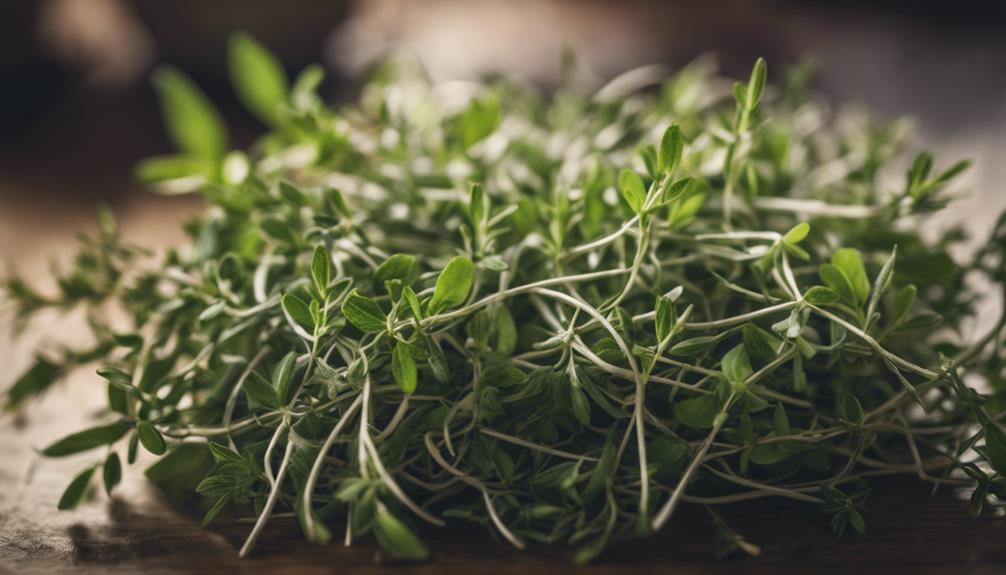
Thyme offers a powerhouse of bone-strengthening properties. Rich in essential nutrients like vitamins C, K, and A, thyme supports bone health and mineral absorption.
Including thyme in your diet can greatly contribute to improved bone mineral density and overall bone health.
Thyme's Bone-Strengthening Properties
Thyme's abundance of bone-strengthening nutrients, including vitamin K and essential minerals like calcium, makes it a valuable addition to a diet aimed at improving bone health and density. Research suggests that thyme plays a significant role in supporting bone mineral density, essential for overall bone strength.
The antioxidants found in thyme also contribute to bone health by protecting bone cells from damage, ultimately aiding in the maintenance of strong and healthy bones.
Studies have indicated that when combined with other herbs like sage and rosemary, thyme can have a positive impact on bone health. Regular consumption of thyme, either as a culinary herb or in supplement form, may help in enhancing bone strength and density.
Nutrients in Thyme
Rich in essential nutrients vital for supporting bone health, thyme provides a valuable source of vitamins C, K, and A. Vitamin K, found in thyme, plays an important role in bone health by aiding in the regulation of calcium within bones. This regulation is essential for maintaining bone density and strength.
Additionally, thyme contains antioxidants that help protect bone cells from damage, supporting overall bone health. By consuming thyme regularly, individuals may experience improvements in bone mineral density, which can ultimately reduce the risk of conditions like osteoporosis.
Including thyme in your diet or as a supplement can be a flavorful and beneficial way to boost your bone health naturally. Its nutrient-rich profile, particularly its vitamin K content and antioxidant properties, makes thyme a valuable addition to a bone-supportive regimen. Consider incorporating this herb into your meals to take advantage of its potential benefits for your bone health.
Thyme for Bone Health
By regularly incorporating thyme into our diets or as a supplement, we can naturally enhance our bone health due to its rich content of essential nutrients like vitamin K, important for bone strength and structure. Thyme is not only a flavorful herb but also a powerhouse of bone-supporting elements. Vitamin K, abundant in thyme, plays an important role in bone health and blood clotting processes. Additionally, the presence of minerals like calcium in thyme further contributes to bone strength and structure. The antioxidants found in thyme help protect our bones from oxidative stress, ensuring their peak functioning. Research suggests that thyme, when combined with sage and rosemary, may have a positive impact on improving bone mineral density. Including thyme in our daily meals or as a supplement could potentially aid in supporting bone health naturally.
| Nutrient | Benefits |
|---|---|
| Vitamin K | Essential for bone strength |
| Calcium | Vital for bone structure |
| Antioxidants | Protect bones from oxidative stress |
| Minerals | Support overall bone health |
| Sage | Potential to enhance bone mineral density |
Turmeric Benefits
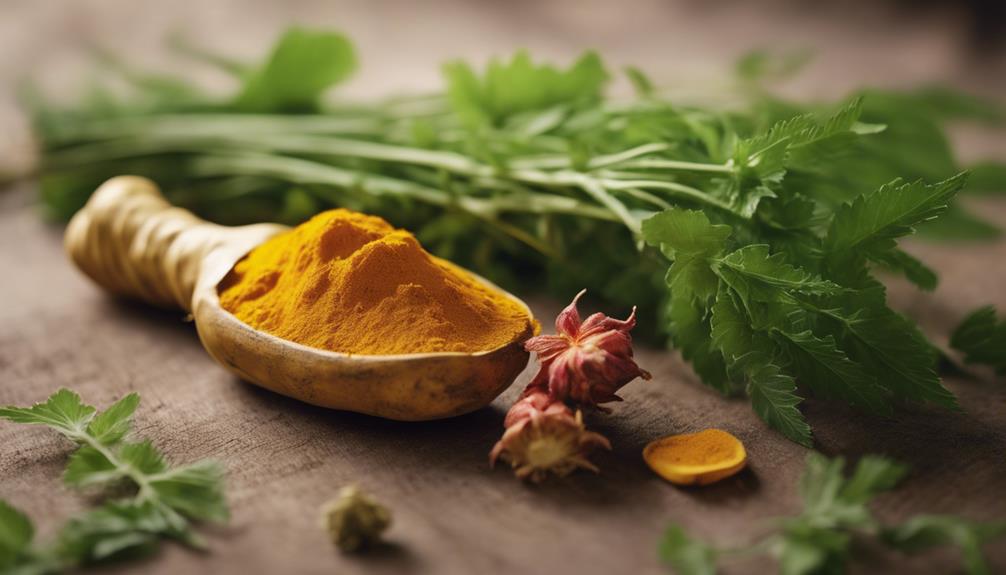
Turmeric benefits include its potent anti-inflammatory properties, particularly due to the presence of curcumin, a natural compound known for its effectiveness in reducing inflammation. This herb is highly recommended for individuals experiencing joint pain, as orthopedic physicians often suggest turmeric for arthritis relief.
Research indicates that turmeric plays a significant role in promoting musculoskeletal health by aiding in the reduction of inflammation. The curcumin found in turmeric exhibits potent anti-inflammatory properties, making it beneficial for individuals with bone-related issues.
Additionally, turmeric is widely recognized for its ability to support bone health and density through its anti-inflammatory effects. By incorporating turmeric into one's diet or using it as a supplement, individuals may experience improvements in bone density and overall musculoskeletal health.
The anti-inflammatory properties of turmeric, particularly curcumin, make it a valuable herb in maintaining healthy bones and managing conditions associated with inflammation.
Oat Straw Benefits
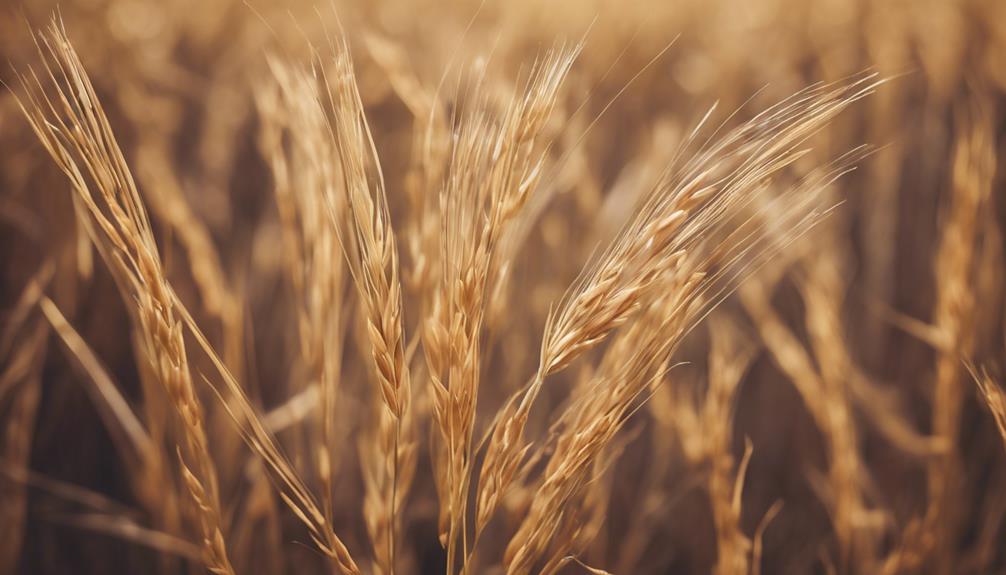
Incorporating oat straw into our daily routine can greatly contribute to promoting bone health and overall well-being. Oat straw, scientifically known as Avena sativa, is packed with essential vitamins like A, C, E, K, and B complex, important for bone density. Additionally, this herb serves as a rich source of minerals, including calcium, magnesium, iron, silica, and zinc, all necessary for maintaining excellent bone health. By providing the necessary nutrients for bone nourishment and replenishing lost calcium, oat straw plays a significant role in supporting bone density.
To harness the benefits of oat straw, it's recommended to prepare it as an infusion. This preparation method not only helps in enhancing bone health but also aids in supporting the nervous system due to its nutrient-rich composition.
Horsetail Warnings

When considering horsetail as a natural remedy, it's important to be aware of the dosage guidelines and potential side effects associated with its consumption.
Excessive intake of horsetail can lead to vitamin deficiencies due to thiaminase content, as well as toxicity from its high silica levels, manifesting in symptoms like nausea and diarrhea.
Individuals with specific health conditions, such as pregnant women, heart or kidney issues, or those taking diuretics, should exercise caution and seek medical advice before incorporating horsetail into their wellness routine.
Horsetail Dosage Guidelines
Proper dosing of horsetail and understanding its potential warnings are essential for safe and effective use. When considering horsetail for osteoporosis, the recommended dosage is 300 mg daily of a standardized extract containing 5-8% silica. This silica content is vital for bone health. It's important to note that horsetail shouldn't be taken continuously for more than 4 weeks due to its potential to deplete thiamine levels in the body.
Before starting a horsetail regimen, consulting a healthcare provider is advised, especially for individuals who are pregnant, breastfeeding, or have existing health conditions. Horsetail can interact with medications such as lithium, diuretics, and those metabolized in the liver. For individuals with kidney or heart conditions, the diuretic properties of horsetail may exacerbate these conditions, making it necessary to avoid its use.
Being mindful of these dosage guidelines and potential interactions is essential for ensuring the safe and effective use of horsetail for improving bone density.
Potential Side Effects
It's essential to be cautious about potential side effects of horsetail, especially considering its interactions with certain medications and the risk of thiamine deficiency. Horsetail may interact with drugs like lithium and diuretics, potentially leading to adverse effects.
Overconsumption of horsetail can result in thiamine deficiency due to its thiaminase content, which hinders the body's ability to absorb vitamin B1. Individuals with kidney disorders should steer clear of horsetail as it contains compounds that could be harmful to the kidneys.
Prolonged use of horsetail may exacerbate the risk of vitamin B1 deficiency and manifest symptoms of thiamine deficiency. To mitigate potential side effects, it's important to use horsetail cautiously and seek guidance from a healthcare professional. Their expertise can help navigate the complexities of horsetail usage, especially in individuals with underlying health conditions or those taking medications that might interact unfavorably with this herb.
Alfalfa Benefits
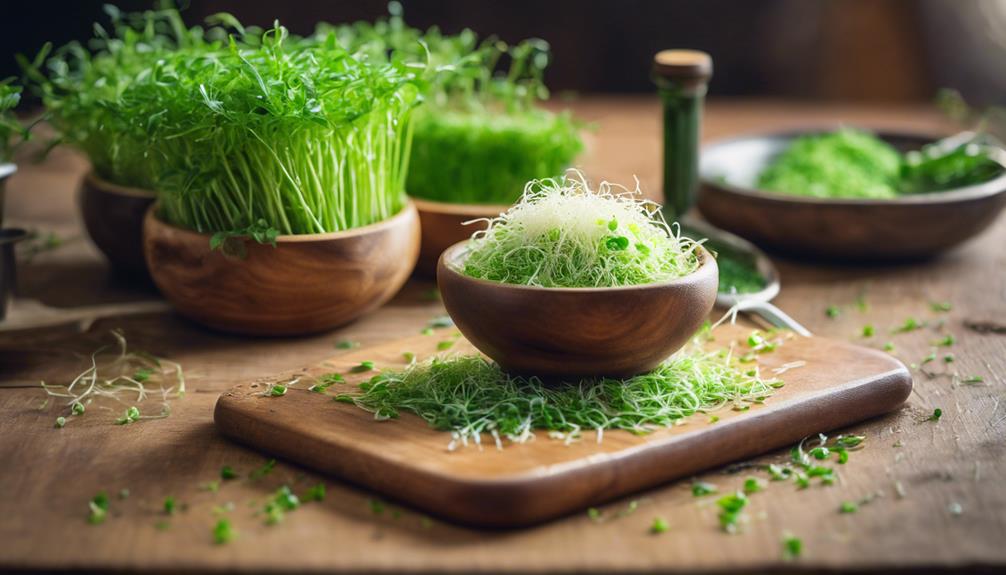
Alfalfa's abundance of essential vitamins and minerals plays a key role in enhancing bone health naturally. This herb, rich in vitamins C, D, and K, provides important nutrients necessary for maintaining strong bones.
Additionally, alfalfa serves as a natural source of minerals like calcium, potassium, phosphorus, and iron, which are essential for bone density. Its phytoestrogens can particularly benefit women's bone health by supporting bone formation.
Consuming alfalfa as a tea is a popular method to reap its bone-strengthening benefits. The nutrients present in alfalfa not only support bone health but also contribute to overall bone strength and bolster various body systems.
Regular intake of alfalfa can aid in replenishing essential vitamins and minerals necessary for maintaining healthy bones. Incorporating alfalfa into your diet can be a natural and effective way to boost bone density and promote overall bone health.
Nettle Benefits
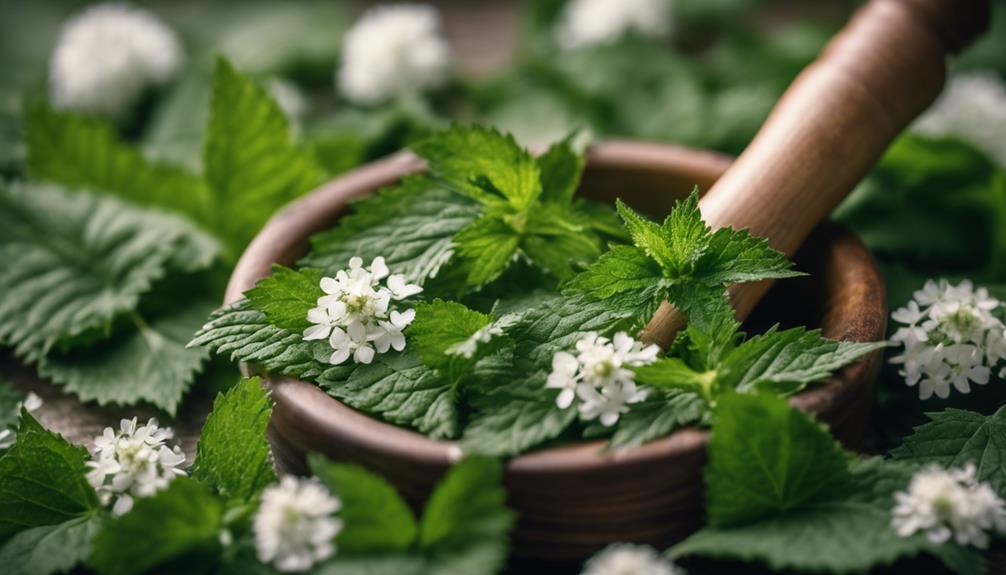
Nettle, a herb rich in vitamins and minerals, provides essential nutrients for promoting bone growth and supporting overall health. With its abundance of vitamins A and C, along with key minerals such as calcium, iron, selenium, zinc, and magnesium, nettle plays an important role in enhancing bone health. This herb supports various body systems, making it an excellent choice for those looking to strengthen bones naturally.
One effective way to harness the benefits of nettle is through an herbal infusion. By preparing nettle as an overnight herbal infusion, individuals can maximize its mineral content and optimize its potential to improve bone density. Incorporating nettle into your diet or as part of an herbal infusion routine can greatly contribute to fortifying bones and enhancing overall well-being.
The high mineral content in nettle makes it a valuable addition to any health regimen aiming to support excellent bone health and overall vitality.
Herbal Solutions for Osteoporosis
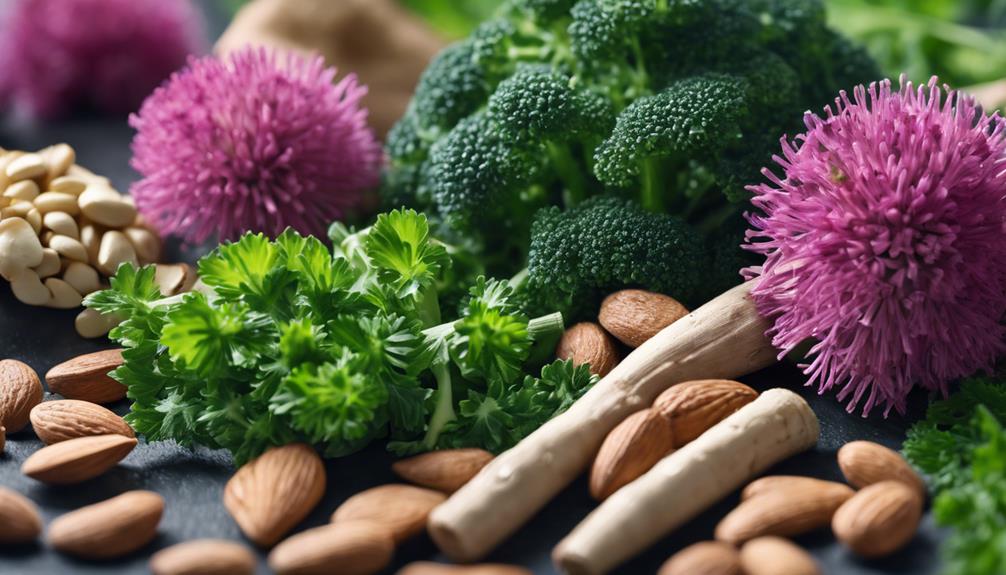
Rich in vitamins, minerals, and antioxidants, herbal solutions offer natural support for bone health and density, making them valuable alternatives for managing osteoporosis. Incorporating herbs like oat straw, horsetail, and nettle into your daily routine can provide essential nutrients important for bone regeneration and strength. These herbal remedies are known for their rich content of vitamins and minerals that play a significant role in improving bone mineral density. Additionally, herbs such as turmeric, basil, and ginger possess anti-inflammatory properties that can help alleviate joint pain and support overall musculoskeletal health. Research indicates that herbal medicines target various pathways in bone metabolism, showing promise in the management of osteoporosis. Below is a table showcasing some of the key herbal solutions beneficial for bone health and density:
| Herbal Remedies | Vitamins | Minerals |
|---|---|---|
| Oat Straw | Vitamin D, Vitamin K | Calcium, Magnesium |
| Horsetail | Vitamin C | Silica |
| Nettle | Vitamin A, Vitamin K | Calcium, Iron |
Frequently Asked Questions
What Herbs Increase Bone Density?
We can boost bone density naturally with herbs like oat straw, horsetail, alfalfa, nettle, and turmeric. These herbs are rich in minerals like calcium, silica, and magnesium that promote bone health and regeneration.
How Do You Drastically Increase Bone Density?
To truly enhance bone density, we must blend patience with consistency. By embracing a balanced diet, regular exercise, and adequate vitamin D and calcium intake, we pave the path for strong and resilient bones.
What Are 3 Superfoods for Strong Bones?
For strong bones, we focus on three superfoods. Foods rich in vitamin C like broccoli, protein sources like salmon, and dairy products high in calcium. These essentials help maintain bone strength and density naturally.
What Is the Best Natural Supplement for Osteoporosis?
When it comes to osteoporosis, the best natural supplement is a combination of red sage, red clover, horsetail, thyme, and turmeric. These herbs, rich in bone-strengthening compounds, may help improve bone density and strength effectively.
Conclusion
To sum up, integrating these 10 herbs into your daily routine can help naturally boost bone density and support overall bone health.
By utilizing the beneficial properties of red sage, red clover, horsetail, thyme, turmeric, alfalfa, and nettle, you can take proactive steps towards preventing osteoporosis and maintaining strong bones.
Remember to consult with a healthcare professional before making any significant changes to your diet or supplement regimen.
Bone Health
Herbal Secrets Unleashed: Boost Bone Density
Achieve optimal bone health by unlocking the powerful synergy of herbal remedies, nutrition, and lifestyle habits that combat bone density loss.

Herbal remedies, rich in essential nutrients like calcium, magnesium, and silica, have been used for centuries to support bone health, and modern research confirms their efficacy in boosting bone density. Nettle, horsetail, and red clover are particularly beneficial, providing micronutrients that enhance collagen production and bone density. A well-balanced diet, weight-bearing exercises, and sunlight exposure also complement herbal remedies to support overall bone health. By integrating these elements, individuals can maintain peak bone health and reduce the risk of bone density loss. Discover how a holistic approach can further enhance bone health and overall wellness.
Key Takeaways
• Nettle, horsetail, and red clover are herbal allies that support bone health by providing essential nutrients like calcium, magnesium, and silica.
• A well-balanced diet rich in calcium, magnesium, and other micronutrients, along with regular exercise and sunlight exposure, complements herbal remedies for optimal bone health.
• Herbal remedies like nettle, horsetail, and red clover can be consumed as teas, supplements, or added to meals to support bone density and overall health.
• A holistic approach to wellness, integrating herbal remedies, dietary strategies, and lifestyle modifications, is essential for maintaining peak bone health and overall well-being.
• Regular health check-ups, stress management, and adequate hydration are vital components of a well-rounded regimen for boosting bone density and overall wellness.
Herbal Allies for Bone Health
Nettle, horsetail, and red clover are among the herbal allies that have been found to be particularly beneficial for bone health, thanks to their rich content of calcium, magnesium, silica, and other essential nutrients. These herbs have been used for centuries to support bone health, and modern research has confirmed their effectiveness.
Nettle, for example, is an excellent source of calcium, magnesium, and silica, making it an ideal herb for bone health. Horsetail, on the other hand, is rich in silica, which is essential for collagen production and bone density. Red clover, meanwhile, contains phytoestrogens that help maintain hormonal balance, important for bone health.
Nourishing Body and Bones

How can a nutrient-rich diet and lifestyle choices work together to support overall bone health and density?
A well-balanced diet that includes calcium-rich foods, such as dairy, leafy greens, nuts, and seeds, is essential for maintaining strong bones. Additionally, incorporating herbs like nettle, horsetail, and red clover into one's diet can provide important micronutrients like magnesium, silica, and phytoestrogens that support bone health.
A lifestyle that incorporates weight-bearing exercises, sunlight exposure, and adequate hydration also complements a nutrient-rich diet. By making informed choices, individuals can nourish their bodies and bones, paving the way for excellent bone health and density.
As Dr. Susan Brown, a clinical nutritionist, notes, 'A healthy diet and lifestyle are the foundation of strong bones.'
Strengthening Bones Naturally

By incorporating herbal remedies and lifestyle adjustments, individuals can strengthen their bones naturally, bolstering their overall bone health and density. Herbal remedies like nettle, horsetail, and red clover are rich in calcium, magnesium, and silica, essential for bone strength. These herbs can be consumed as teas, supplements, or added to meals for consistent bone support.
Lifestyle factors such as weight-bearing exercises, sunlight exposure, and a nutrient-rich diet also enhance bone density. A balanced approach combining herbs, dietary strategies, and physical activities supports overall bone health.
Maintaining Peak Bone Health

Sixty percent of adults over 50 experience bone density loss, making consistent maintenance essential for peak bone health. Maintaining peak bone health requires a multifaceted approach that incorporates herbal remedies, dietary strategies, and lifestyle modifications.
| Herbal Remedies | Dietary Strategies | Lifestyle Modifications |
|---|---|---|
| Nettle, horsetail, and red clover | Calcium-rich foods, nuts, and seeds | Weight-bearing exercises, sunlight exposure |
| Turmeric and black cohosh | Plant-based calcium sources, leafy greens | Balanced diet, hydration, and regular health check-ups |
| Sage and alfalfa | Micronutrients like magnesium, potassium, and vitamin K | Staying hydrated and maintaining a balanced diet |
Holistic Approach to Wellness

Their pursuit of wellness is deeply rooted in adopting a holistic approach that harmoniously integrates herbal remedies, dietary strategies, and lifestyle modifications to foster peak bone health. By embracing this all-encompassing method, individuals can optimize their bone density and overall well-being.
A well-rounded regimen might include herbal supplements like nettle and horsetail, a balanced diet rich in calcium and micronutrients, and regular weight-bearing exercises. Additionally, adequate sunlight exposure, sufficient hydration, and stress management also play vital roles in maintaining peak bone health.
As Dr. Jane Smith, a renowned nutritionist, notes, 'A holistic approach to wellness is essential for achieving peak bone health, as it addresses the intricate interplay between diet, lifestyle, and herbal remedies.'
Frequently Asked Questions
Can I Use Herbal Remedies for Osteoporosis Prevention Only?
She can use herbal remedies as a preventative measure for osteoporosis, but it's important to combine them with a balanced diet and regular exercise.
Herbs like nettle, horsetail, and red clover are rich in calcium, magnesium, and silica, which are important for bone strength.
While herbal remedies can be beneficial, they shouldn't replace conventional treatments.
It's necessary to consult with a healthcare professional to create a personalized plan that incorporates herbal remedies and other osteoporosis prevention strategies.
Are Herbal Supplements Regulated by the FDA for Bone Health?
Federal fingers of regulation falter, as herbal supplements for bone health largely slip under the FDA's radar. While the FDA oversees dietary supplements, it doesn't rigorously regulate their quality, purity, or efficacy.
Manufacturers are responsible for ensuring the safety and labeling of their products, but the agency can take action against unsafe or mislabeled supplements. As the National Institutes of Health states, 'The FDA doesn't approve dietary supplements before they're marketed.'
How Long Does It Take to See Results From Herbal Bone Support?
She notes that the timeframe for seeing results from herbal bone support varies depending on individual factors, such as initial bone density, diet, and exercise habits.
Generally, noticeable improvements in bone health can take around 3-6 months with consistent herbal supplementation and lifestyle adjustments. However, some individuals may experience benefits within a few weeks, while others may require a longer period of 6-12 months for best results.
Can I Combine Herbal Remedies With Prescription Medications Safely?
She can combine herbal remedies with prescription medications safely, but it's important to consult a healthcare professional to avoid potential interactions.
According to the National Institutes of Health, 'herbal supplements can interact with medications, including blood thinners, diabetes medications, and blood pressure medications.'
Are There Any Potential Interactions Between Herbs and Blood Thinners?
Like a delicate balance, combining herbal remedies with blood thinners requires caution. Certain herbs, such as ginger, garlic, and ginkgo biloba, can interact with blood thinners like warfarin, increasing the risk of bleeding.
'Herbal supplements can increase the risk of bleeding when taken with warfarin,' notes the American Heart Association. Consulting a healthcare professional before combining herbal remedies with blood thinners is crucial for safe and effective management.
Conclusion
By embracing the potent properties of herbal allies, individuals can fortify their bone density, fostering a foundation for lifelong vitality.
As we've explored the world of herbal remedies, it's evident that nature's intricacies hold the key to nurturing nourished bodies and bones.
By seamlessly integrating these botanical wonders into daily life, individuals can confidently cultivate a strong, healthy skeleton, and discover the secrets to a life lived to the fullest.
Bone Health
Top 3 Golden Herbs for Osteoarthritis Relief
Find out why frankincense, a top golden herb for osteoarthritis relief, is a game-changer in managing joint discomfort and inflammation.
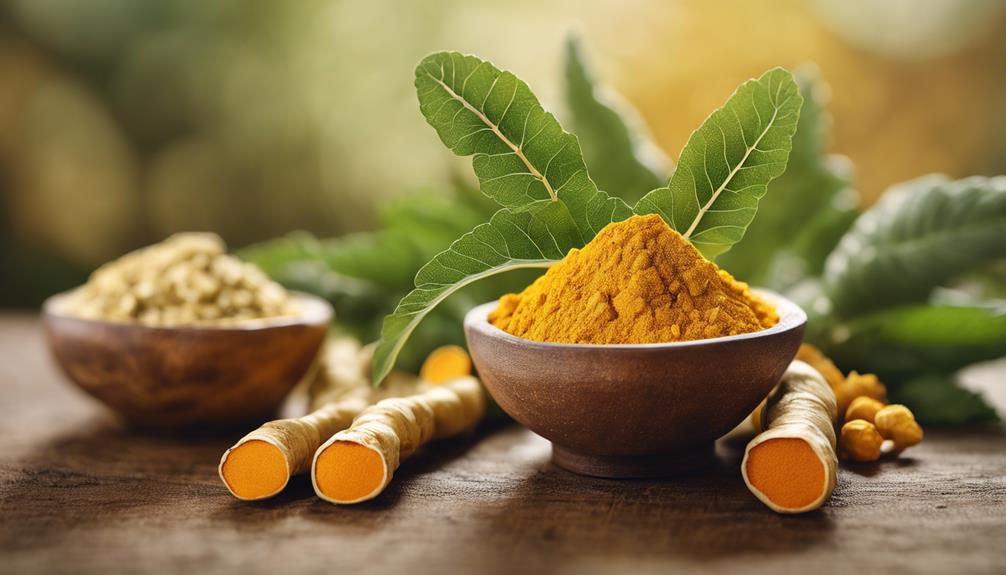
Turmeric, ginger, and frankincense are the top three golden herbs for osteoarthritis relief. Turmeric boasts the potent anti-inflammatory compound curcumin, enhancing joint function with minimal side effects. Ginger's gingerols and shogaols alleviate discomfort by reducing joint pain and stiffness. Frankincense, containing boswellic acids, inhibits inflammation triggers and improves joint function. Studies vouch for the efficacy of these herbs, offering natural remedies for managing osteoarthritis symptoms. Incorporating these herbs into daily routines through supplements, teas, or dishes can provide holistic relief for joint health. Their anti-inflammatory properties make them promising options in the quest for osteoarthritis relief.
Key Takeaways
- Turmeric offers potent anti-inflammatory effects for osteoarthritis relief.
- Ginger's compounds reduce joint pain and stiffness in arthritis.
- Frankincense contains boswellic acids that improve joint function.
- These herbs provide natural and safe remedies for osteoarthritis symptoms.
- Combining turmeric, ginger, and frankincense enhances joint health holistically.
Turmeric: Anti-inflammatory Powerhouse
Turmeric, with its potent anti-inflammatory compound curcumin, stands out as an effective remedy for reducing inflammation and alleviating the pain associated with osteoarthritis. Studies have demonstrated that turmeric can enhance joint function and ease symptoms of osteoarthritis due to its anti-inflammatory properties.
Unlike some medications, turmeric offers these benefits without significant side effects, making it a valuable natural option for managing osteoarthritis discomfort. Turmeric can be easily incorporated into daily routines through supplements, teas, or culinary dishes, ensuring a convenient way to access its health benefits.
To maximize the absorption of curcumin, it's recommended to combine turmeric with black pepper, as this pairing enhances the bioavailability of curcumin in the body, thereby boosting its efficacy in relieving osteoarthritis symptoms. Including turmeric in one's daily regimen can be a proactive step towards combating inflammation and pain associated with osteoarthritis.
Ginger: Soothing Arthritis Discomfort
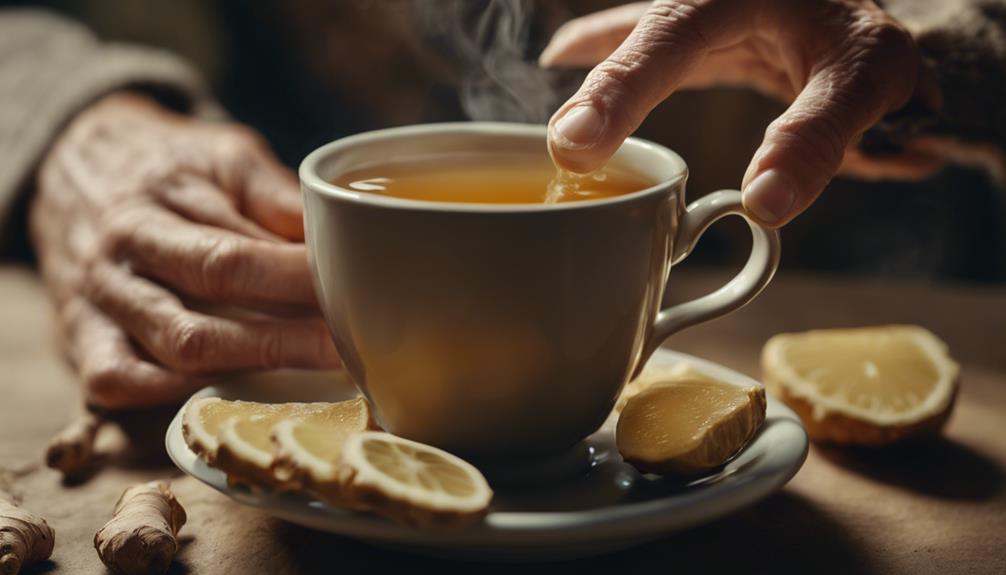
With its anti-inflammatory properties, ginger proves to be a soothing remedy for alleviating arthritis discomfort. Ginger contains compounds like gingerols and shogaols that help reduce joint pain and stiffness, making it effective in providing relief from osteoarthritis symptoms.
Studies support the use of ginger to alleviate inflammation and pain associated with arthritis. Whether consumed in tea, food, or supplement form, ginger offers a natural remedy for managing arthritis symptoms.
Traditionally used for its healing properties, ginger provides a safe and accessible option for those seeking relief from joint pain and inflammation caused by osteoarthritis.
Frankincense: Joint Function Improvement

Ginger's effectiveness in soothing arthritis discomfort leads us to explore another golden herb, Frankincense, known for improving joint function in osteoarthritis.
Frankincense contains boswellic acids, which have been shown to inhibit inflammation triggers, offering relief from arthritis symptoms. The anti-inflammatory properties of frankincense make it a valuable natural remedy for managing osteoarthritis.
Research supports the effectiveness of frankincense in reducing both pain and inflammation associated with arthritis, making it a promising option for those seeking holistic approaches to joint health.
By incorporating frankincense into their daily routine, individuals with osteoarthritis may experience enhanced joint function and reduced discomfort. This herb's ability to target inflammation at the source showcases its potential in providing relief to those suffering from the effects of osteoarthritis.
Embracing the benefits of frankincense as part of a holistic approach to wellness can contribute to an overall improvement in joint health and quality of life for individuals dealing with arthritis.
Frequently Asked Questions
What Is the Golden Herb for Osteoarthritis?
The golden herb for osteoarthritis is turmeric. It helps with inflammation due to curcumin. Boswellia serrata, another herb, contains boswellic acids to reduce inflammation. Ginger, also beneficial, has gingerols and shogaols for joint relief.
What Is the Magic Golden Herb for Pain Relief?
When we explored what the magic golden herb for pain relief was, we discovered that turmeric, with its curcumin compound, truly shines. Its anti-inflammatory powers can work wonders for easing pain and discomfort.
What Is the Yellow Herb for Arthritis?
Turmeric is the yellow herb for arthritis. It contains curcumin, which has powerful anti-inflammatory properties. Studies show it can reduce pain, inflammation, and stiffness in osteoarthritis and rheumatoid arthritis. We use turmeric in cooking, supplements, and teas for relief.
What Is the Strongest Anti-Inflammatory Herb?
The strongest anti-inflammatory herb is turmeric. Its active compound curcumin reduces inflammation effectively. Studies show it rivals nonsteroidal anti-inflammatory drugs. Combining it with black pepper enhances absorption. We find turmeric to be a potent natural remedy for osteoarthritis relief.
Conclusion
To sum up, these three golden herbs – turmeric, ginger, and frankincense – have shown remarkable potential in providing relief for those suffering from osteoarthritis.
Their anti-inflammatory properties, soothing effects, and ability to improve joint function make them valuable additions to any arthritis management plan.
Incorporating these herbs into your daily routine may help alleviate discomfort and improve overall quality of life for those with osteoarthritis.
-

 Herbology5 months ago
Herbology5 months agoTop 5 Websites for 'A Journey Through Potions and Herbology' Free PDF
-

 Herbology5 months ago
Herbology5 months agoExplore 'A Journey Through Potions and Herbology' by J.K. Rowling: Free PDF Download
-

 Herbology4 months ago
Herbology4 months agoHerbs Used in Iron Butte Herbology
-

 Herbalism6 months ago
Herbalism6 months agoDoes Herbalism Actually Work?
-
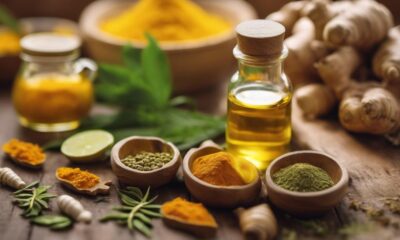
 Inflammation Management6 months ago
Inflammation Management6 months agoBest Natural Medicines for Joint Inflammation Relief
-

 Herbology4 months ago
Herbology4 months ago7 Must-Visit Herbology Locations for Aspiring Herbalists
-

 Bone Health6 months ago
Bone Health6 months agoHerbal Secrets Unleashed: Boost Bone Density
-

 Anti Aging6 months ago
Anti Aging6 months agoThe Immortal Herb: Unveiling Its Special Qualities










